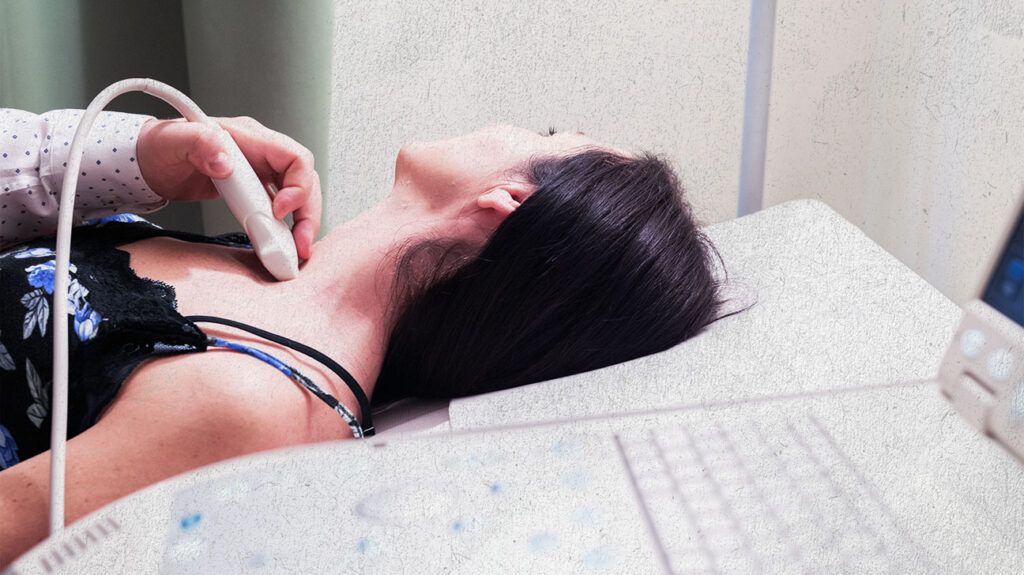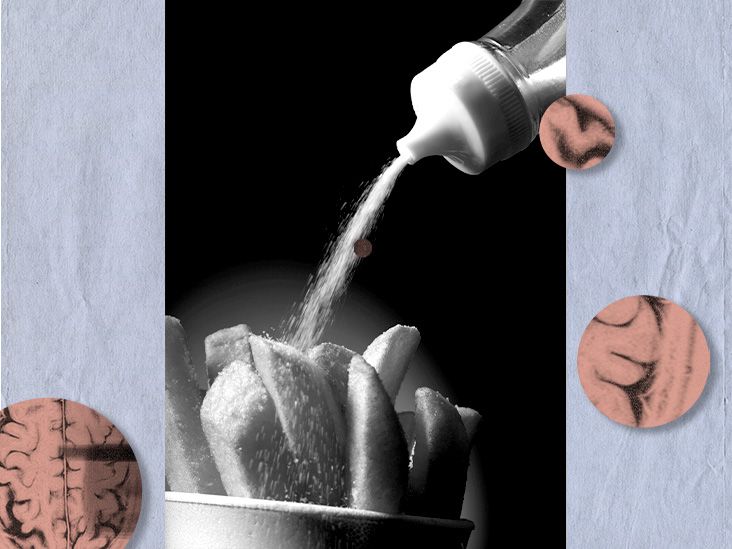Graves’ disease occurs when the thyroid overproduces thyroid hormones, causing hyperthyroidism. Hashimoto’s disease includes an underactive thyroid that does not produce enough thyroid hormones, causing hypothyroidism. These are two different types of thyroid disease.
Graves’ disease and Hashimoto’s disease are both autoimmune conditions that affect the thyroid gland. Both conditions present distinct symptoms and impact an individual’s health differently.
While Graves’ disease typically results in hyperthyroidism, which causes an overactive thyroid, Hashimoto’s usually leads to hypothyroidism, or an underactive thyroid.
This article explores the differences and similarities between these two conditions, examining their causes, symptoms, treatments, and more.

This section looks at the differences between Graves’ and Hashimoto’s disease.
What is Graves’ disease?
Graves’ disease is an autoimmune disease that leads to the
Graves’ disease occurs when the immune system mistakenly attacks the thyroid gland,
Learn more about Graves’ disease.
What is Hashimoto’s?
Hashimoto’s disease, also known as Hashimoto’s thyroiditis or chronic lymphocytic thyroiditis, is another autoimmune disease where the immune system attacks the thyroid gland. However, with Hashimoto’s, the attack leads to inflammation and damage that gradually
Hashimoto’s is the most common cause of an underactive thyroid, also known as hypothyroidism. According to the
The chance of developing Hashimoto’s also increases if other family members have the disease.
Learn more about Hashimoto’s disease.
| Feature | Graves’ disease | Hashimoto’s disease |
| Nature of thyroid dysfunction | overactive thyroid (hyperthyroidism) | underactive thyroid (hypothyroidism) |
| Gender prevalence | more common in females | more common in females |
| Age of onset | over 30 | typically 30 and 50, although it may occur in teens |
| Common symptoms | weight loss rapid heartbeat anxiety | weight gain fatigue depression |
| Treatment | antithyroid medications radioactive iodine uptake surgery | thyroid hormone replacement therapy |
Graves’ disease and Hashimoto’s disease have symptoms in common. Some may overlap, while others are different, helping to differentiate between the two conditions.
Symptoms of Graves’ disease
Graves’ disease often causes symptoms of hyperthyroidism, as well as problems with the eyes and skin. Common symptoms include:
- weight loss, despite an increase in appetite
- rapid or irregular heartbeat
- anxiety
- difficulty sleeping or fatigue
- shaky hands
- muscle weakness
- sweating and heat intolerance
- frequent bowel movements
- diarrhea
- a goiter, or an enlarged thyroid gland
More than
Eye symptoms can include:
- bulging eyes
- gritty eyes
- sensitivity to light
- pressure or pain in the eyes
- blurry or double vision
Symptoms of Hashimoto’s disease
Hashimoto’s disease can cause a range of symptoms, including:
- tiredness or fatigue
- weight gain
- feeling cold
- joint or muscle pain
- muscle weakness
- constipation
- heavy or irregular menstruation
- difficulty becoming pregnant
- slowed heart rate
- swelling or puffiness of the face
- pale, dry skin
- hoarse voice
- depression
Learn more about the signs and symptoms of hypothyroidism.
Individuals experiencing symptoms of thyroid dysfunction, such as significant weight changes, unexplained fatigue, or changes in heart rate, should seek medical advice.
Early detection and treatment are crucial to managing both Graves’ disease and Hashimoto’s disease effectively.
Learn more about common thyroid disorders.
According to the
Individuals with a family history of the conditions are also more likely to develop Graves’ disease and Hashimoto’s disease.
In Graves’ disease, the immune system produces antibodies called thyroid-stimulating immunoglobulin (TSI) that attach to the thyroid cells, causing them to produce excess hormones.
In Hashimoto’s disease and hypothyroidism, the immune system attacks the thyroid gland, leading to inflammation and damage. Other triggers may also
- some medicines that treat bipolar disorder or other mental health conditions
- medicines containing iodine that treat abnormal heartbeats
- exposure to toxins, such as radiation
Learn more about the thyroid gland.
Doctors use thyroid tests to check how well the thyroid works and diagnose Graves’ disease or Hashimoto’s disease. A thyroid test may
- medical history
- physical exam to check for a goiter
- blood tests to measure levels of thyroid hormones, including TSH, T4, T3, and thyroid antibody tests
radioactive iodine uptake testTrusted Source - thyroid scan
- ultrasound
If a doctor finds a nodule or lump in the neck during a physical exam or thyroid imaging test, individuals
Learn more about how doctors diagnose hypothyroidism.
Treatment for Grave’s disease and Hashimoto’s disease requires different strategies.
Treatment for Graves’ disease
Treatment for Graves’ disease involves treating hyperthyroidism, including:
- Medication: Antithyroid medications, such as
methimazoleTrusted Source orpropylthiouracilTrusted Source , can helpreduceTrusted Source thyroid hormone production. A doctor may also prescribe beta-blockers to reduce symptoms. However, they do not stop thyroid hormone production. - Radioactive iodine (RAI): This treatment permanently destroys the thyroid tissue, reducing hormone production.
- Thyroid surgery: Doctors may recommend surgery to treat people with large goiters or people who are pregnant and cannot take antithyroid medicines.
Learn about foods to eat and avoid with hyperthyroidism.
Treatment for Hashimoto’s disease
Treatment for Hashimoto’s disease depends on whether it causes hypothyroidism. If hypothyroidism is not present, regular monitoring of symptoms and thyroid hormone levels is often sufficient.
If a doctor diagnoses hypothyroidism, treatment
Certain foods and supplements can interfere with levothyroxine absorption, so individuals should follow guidelines correctly.
Learn more about food and diet with hypothyroidism.
Graves’ disease and Hashimoto’s disease both require treatment. If left untreated, a person can develop complications.
Complications of Graves’ disease
Without treatment, Graves’ disease can cause serious complications, including:
- Heart complications: Including rapid heart rate and atrial fibrillation that may lead to blood clots, a stroke, or heart failure
- Muscle and bone mass loss: Thinning bones, osteoporosis, and a loss in muscle strength
- Fertility: Complications with pregnancy and the menstrual cycle
- Thyroid storm: A life threatening condition with severe symptoms
Learn about the long-term effects of Graves’ disease.
Complications of Hashimoto’s disease
Individuals with Hashimoto’s disease can develop hypothyroidism. Without treatment, hypothyroidism can lead to several complications, including:
- high cholesterol
- heart disease and heart failure
- high blood pressure
- myxedema, a rare but severe form of hypothyroidism
- a higher risk of
thyroid lymphomaTrusted Source
Without treatment, hypothyroidism can also cause complications during pregnancy.
Learn more about what happens if hypothyroidism is left untreated.
With appropriate treatment, individuals with Graves’ disease or Hashimoto’s disease can manage their symptoms effectively and lead healthy lives. Regular monitoring and adjustments in treatment are necessary to maintain optimal thyroid function.
There is no definitive way to prevent Graves’ disease or Hashimoto’s disease due to their autoimmune nature. However, managing stress, avoiding excessive iodine intake, and regular medical check-ups may help reduce the risk of triggering these conditions.
Graves’ disease and Hashimoto’s disease, also known as Hashimoto’s thyroiditis, are autoimmune conditions affecting the thyroid gland. However, they both lead to opposite conditions, such as hyperthyroidism and hypothyroidism. Despite their differences, both conditions require careful management and medical intervention.
Early diagnosis and treatment can significantly improve the quality of life and prevent serious complications. Understanding these conditions’ symptoms, causes, and treatments enables patients to seek timely medical advice and maintain their health.


